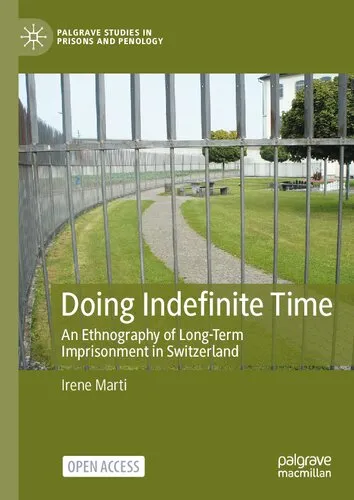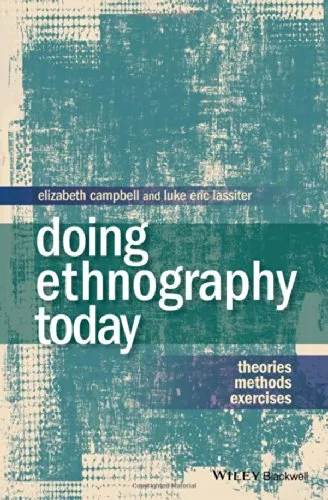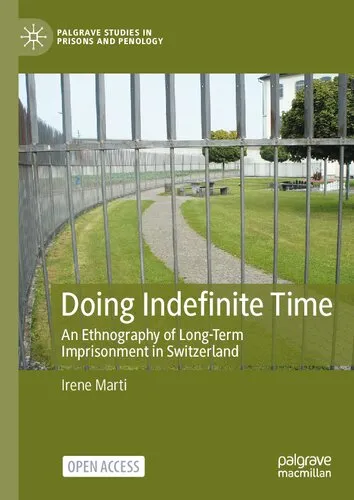Doing Indefinite Time: An Ethnography of Long-Term Imprisonment in Switzerland (Palgrave Studies in Prisons and Penology)
4.0
Reviews from our users

You Can Ask your questions from this book's AI after Login
Each download or ask from book AI costs 2 points. To earn more free points, please visit the Points Guide Page and complete some valuable actions.Related Refrences:
Introduction to "Doing Indefinite Time: An Ethnography of Long-Term Imprisonment in Switzerland"
In "Doing Indefinite Time: An Ethnography of Long-Term Imprisonment in Switzerland," the complexities of incarceration, human endurance, and the contradictions of the Swiss penal system come to light through an engaging ethnographic lens. This book ventures deep into the often-overlooked realities of prisoners serving long-term or indefinite sentences in Switzerland, offering a rare and intimate exploration of their challenges, resilience, and survival strategies. Through meticulous research and first-person narratives, I examine the profound psychological, social, and institutional consequences of indefinite confinement, a subject relevant to global discussions about the ethics of prolonged incarceration.
Written for sociologists, criminologists, policymakers, anthropologists, and anyone fascinated by the sociology of imprisonment, this book blends rich ethnographic fieldwork with theoretical insights. By situating Swiss penal practices within both local and global contexts, it seeks to challenge preconceived notions about long-term imprisonment while amplifying the often-silenced voices of those who live it.
Summary of the Book
The book is based on an in-depth ethnographic study conducted in Swiss prisons, where long-term and indefinite sentences are prominent features of the penal landscape. It examines how incarcerated individuals grapple with the notion of time, identity, and existence under conditions that offer little certainty about the duration of their imprisonment. Using interviews, observations, and rich field notes, I capture the nuances of daily life behind bars, exploring how prisoners build routines, form relationships, and struggle to maintain their sense of self.
Set against the backdrop of Switzerland's progressive yet paradoxical penal philosophy, the book delves into the tension between humane treatment and the punitive realities of indefinite time. Themes of accountability, rehabilitation, social reintegration, and compliance are discussed in detail. Critically, I also explore the role of prison staff and administrators, bringing their perspectives into the narrative to provide a fuller understanding of the penal system's functioning.
By weaving theoretical frameworks on time, power, and justice with lived experiences, "Doing Indefinite Time" offers a multi-dimensional portrayal of a complex penal institution and interrogates what prolonged confinement says about modern society.
Key Takeaways
- Long-term imprisonment affects not just the physical freedom of individuals, but also their perception of time, identity, and relationships.
- Swiss prisons, known for their progressive image, reflect broader contradictions between rehabilitative ideals and punitive practices.
- Indefinite sentencing creates unique challenges, as prisoners and staff alike navigate lives defined by uncertainty and stagnation.
- Relationships within prisons (both among prisoners and between prisoners and staff) are deeply influenced by institutional structures and individual coping strategies.
- The book provides a foundation for rethinking how justice, punishment, and rehabilitation can coexist in humane and sustainable ways.
Famous Quotes from the Book
-
"Time, for those enduring indefinite imprisonment, is not a passage but an abyss — a space in which they are suspended, unable to either move forward or return to what was left behind."
-
"The prison operates both as a space of punishment and paradoxically as a space of supposed renewal, yet the contradictions within these dual roles loom large and unresolved."
-
"In the absence of freedom, some prisoners create meaning in the smallest of rituals, turning the mundane into acts of resistance against a system that seeks to strip them of autonomy."
Why This Book Matters
"Doing Indefinite Time" addresses critical questions about justice, punishment, and the human capacity for adaptation. In an era when mass incarceration is debated across the globe, this book sheds light on a little-studied context: the Swiss penal system, which often appears as a model of progressive incarceration. Through rich ethnographic evidence, it challenges this idealized view, revealing the ethical and human dilemmas at the core of indefinite sentencing.
By centering the lived experiences of prisoners and prison staff, the book pushes readers to confront uncomfortable truths about the balance—or imbalance—between punishment and rehabilitation. More importantly, it serves as a call to action for policymakers, encouraging critical reflection on the purpose and consequences of long-term incarceration in societies that claim to prioritize human rights and social reintegration.
This book is not merely academic—it is deeply human. It hopes to inspire conversations among scholars, practitioners, and the general public about how we can create more just, compassionate, and effective penal systems in the future.
Free Direct Download
You Can Download this book after Login
Accessing books through legal platforms and public libraries not only supports the rights of authors and publishers but also contributes to the sustainability of reading culture. Before downloading, please take a moment to consider these options.
Find this book on other platforms:
WorldCat helps you find books in libraries worldwide.
See ratings, reviews, and discussions on Goodreads.
Find and buy rare or used books on AbeBooks.
1270
بازدید4.0
امتیاز0
نظر98%
رضایتReviews:
4.0
Based on 0 users review
Questions & Answers
Ask questions about this book or help others by answering
No questions yet. Be the first to ask!













